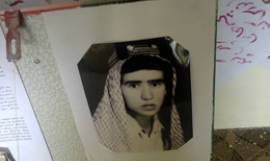By Esmatullah Mayar
Shab-e-Barat, "the Night of Forgiveness", is an Islamic holiday celebrating God's mercy. People pray for forgiveness for those who died. Families invite their daughters and sisters on this night. Shab-e-Barat was when 55-year-old Mahparwar's younger brother was killed by the mujahedin. A testimony*
"The memories of my brother still move me to tears," she says of a brother who was killed 21 years ago. Mahparwar is now the member of the Women's Council in Chehelsotoon, Kabul city. The council was set up to support survivors of war.
She says her family lived through the anarchy of the Najibullah government, sharing the grief of relatives who lost near and dear ones. On the 15th of Shoban, 1370 (July 5, 1991 in the Gregorian calendar) celebrated as Shab-e-Barat tragedy struck them.

Photo: The Killid Group
"It was last days of Dr Najib's regime. The war between government forces and jihadist parties had engulfed the country. My19-year- old brother was travelling to Jalalabad when armed people (mujahedin) came down from the mountains in Mashal Kandaw (on the highway between Kabul and Jalalabad), abducted and killed him immediately," she told Killid.
Mahparwar says her brother Mohammad Shafi was a cycle repairer in Kabul. He had no connection with any political party. Yet he was killed by "armed people". "He was not a member of either Khalq or Parcham (both communist parties that ruled Afghanistan after the assassination of president Daud Khan in April 1978). He did not have a job with the government or any organisation. He was married only a year before, and had a pair of twins, a daughter and son. My new sister-in-law was widowed," she says.
His killers left his body on the roadside and fled. The road was under the control of the Hezb Islami led by Gulbuddin Hekmatyar.
"We got to know about his murder on Barat night but we could not find his body. My other brothers searched all over. Some of our relatives said they had seen our brother in their dreams, and we should search for him in the places they mentioned. My brothers went everywhere. In the end we found him in a hospital mortuary."
Death of innocents
Mahparwar wiped her tears on her shawl before continuing with her story. "I had been kept unaware. All they told me was that Shafi was injured, and was found in the Kabul hospital. But when I went to my father's house I saw a friend of my brother, a soldier in the army, weeping loudly. … We buried him in Charqala village of Chardehe (Kabul province). My mother has not been well ever since."
Mahparwar says Shafi, her brother, was the cleverest and most hardworking of her siblings. He worked in his bicycle repair shop steadily through the winter and long hot summer. He did not waste his time in idle gossip. "My sister-in-law remarried, and took their son with her. His name is Sahel, he looks very much like my brother," she adds.

Hezb-e-Islami was led by this infamous warlord Gulbuddin Hekmatyar. (Photo: http://costofwar.wordpress.com/2011/04/19/hekmatyar-the-compromise/)
The situation in Kabul went from bad to worse when Najibullah's government was toppled by mujahedin forces who then turned on each other. People fled the city in the tens of thousands. Mahparwar too became a refugee in Peshawar. Bad news continued to pour across the border. "There was not one day when we did not hear of the death of relatives in Afghanistan. My younger sister's husband was killed in the war between Hezb Islami and the Hezb-e-Islami led by General Dostum in Mazar-e-Sharif."
Lost futures
Mahparwar says the civil war ruined her family. In her childhood she had built castles in the air for her family but the "warlords dashed everyone's dreams and hopes". She says her brothers are poor. "One is a taxi driver; the other one is doing labour work. A third is a mechanic. All of them are poor; the war took everything from us."
Mahparwar's children go to school, and she says she is happy for them. But she is haunted by the fact that her brother's killers are at large. "Arrest the murderers of my brother. Arrest the murderers of many others as well. They should be tried. They made us weep. They took away our breadwinners from us. I can never forgive them."
Mahparwar wants all the stories of the people who were killed and injured in three decades of war in Afghanistan collected and archived. "Future generations can see how our country was tyrannised," she says.
She warns today's purveyors of terror that they should "fear God". Raising a finger up to the sky, she reminds them, "Doomsday is coming. There is God and hereafter, fear God. For the sake of God curse the weapon!"
* The testimonies of survivors of war crimes are our contribution to creating greater public awareness about people's hopes and claims for justice, reconciliation and peace. These testimonies and life stories are distributed internationally by the news agency IPS-Inter Press Service and are the basis for a radio drama that is being broadcast by seven Killid radios.



